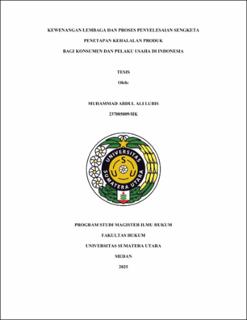| dc.contributor.advisor | Sirait, Ningrum Natasya | |
| dc.contributor.advisor | Siregar, Mahmul | |
| dc.contributor.author | Lubis, Muhammad Abdul Ali | |
| dc.date.accessioned | 2025-05-20T06:47:02Z | |
| dc.date.available | 2025-05-20T06:47:02Z | |
| dc.date.issued | 2025 | |
| dc.identifier.uri | https://repositori.usu.ac.id/handle/123456789/103947 | |
| dc.description.abstract | The issue of the halal labelization process for food and beverage products is getting the attention of the public. Instant food products, fast food, restaurants to market snacks are vulnerable to being droated by types of food that are not halal both in terms of ingredients, and the process. The issue of the halal labelization process has changed since the beginning of the implementation of halal labelization until the emergence of several rules, namely Law No. 33 of 2014 and was updated with Law No. 6 of 2023. This study uses normative legal research methods (juridical normative) to obtain Valid and accountable research results, it is necessary to use data collection techniques and tools, namely, library research and field research in the form of interviews. The tools used in this research method include document studies and interview guidelines. From the results found that the authority in the halal labelization process by BPJPH has not created legal certainty and is ambiguous and is not clear because of the existence of two institutions that have the same authority in one task, considering that the Fatwa Committee has a specific space and the same role as the MUI is only distinguished on the pathway Registration is MUI Regular Pathway and Halal Fatwa Committee Self Declare Pathway. The process of resolving disputes in determining the halal product of the MUI and the BPJPH Halal Fatwa Committee faces two obstacles, namely because the emergence of the BPJPH Halal Fatwa Committee presents a halal labelis registration process called Self Declare. The Self Declare Path does not yet have a guideline for dispute resolution in it, also in its application there has not been provided complaints features if violations are found both committed by halal companions, business actors and consumers themselves. Then until now there are no specific rules in Law No. 33 of 2014 and Law No. 6 of 2023 which regulates the process of resolving disputes and legal efforts that can be carried out and who has the authority to become a place to resolve the dispute determination of product halal. In terms of legal protection for consumers and business actors in halal labelization, it is weak because regulators there is no law that is explicitly regulating consumer protection for the halal product of a special product, as well as which regulates legal efforts against the protection of halal products for consumers and business actors which has an impact on the limitations of guaranteeing consumer protection for the halalness of a product. | en_US |
| dc.language.iso | id | en_US |
| dc.publisher | Universitas Sumatera Utara | en_US |
| dc.subject | Legal Certainty | en_US |
| dc.subject | Legal Protection | en_US |
| dc.subject | Halal Labelization Process | en_US |
| dc.subject | BPJPH | en_US |
| dc.subject | MUI | en_US |
| dc.title | Kewenangan Lembaga dan Proses Penyelesaian Sengketa Penetapan Kehalalan Produk Bagi Konsumen dan Pelaku Usaha di Indonesia | en_US |
| dc.title.alternative | Authority of Institutions and the Process of Resolving Disputes over Product Halal Certification for Consumers and Business Actors in Indonesia | en_US |
| dc.type | Thesis | en_US |
| dc.identifier.nim | NIM237005009 | |
| dc.identifier.nidn | NIDN0017016203 | |
| dc.identifier.nidn | NIDN0020027303 | |
| dc.identifier.kodeprodi | KODEPRODI74101#Magister Ilmu Hukum | |
| dc.description.pages | 234 Pages | en_US |
| dc.description.type | Tesis Magister | en_US |
| dc.subject.sdgs | SDGs 16. Peace, Justice And Strong Institutions | en_US |


